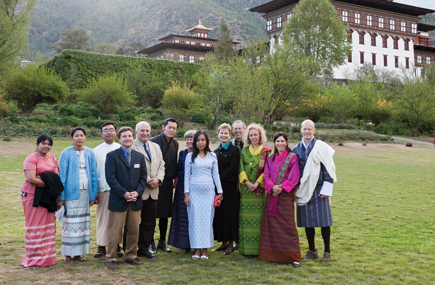Learn how to plan a medical volunteering trip overseas
If your idea of a stimulating vacation involves unsafe destinations, bribing foreign officials for a medical license and practicing resource-limited hospitals, then there's an organization willing to set it all up for you. (You also get to meet kings and see beautiful scenery.).
Volunteering overseas may be an appealing, but also intimidating, vacation option for some U.S. physicians. After all, taking a volunteer trip is obviously a little more complicated than booking a beachfront hotel and hopping a plane.
But how complicated is it? And what are the benefits? To learn what's actually entailed in a medical volunteering trip, ACP Internist/ACP Hospitalist recently spoke to ACP Member Peter Curran, MD, an endocrinologist in Idaho.

Dr. Curran has volunteered in Bhutan, Cambodia, India and Uganda. He is a member of the internal medicine steering committee and board of directors of Health Volunteers Overseas (HVO), a nonprofit organization that's currently celebrating its 25th anniversary of improving the availability and quality of health care in developing countries through training and educating local clinicians.
Q: What leads physicians to want to volunteer with groups like HVO?
A: Motivations differ, but for me, when I started my overseas volunteering experiences, I did it because I was looking for something different to do. A lot of doctors feel like they are in a bit of a rut. The first place I went to was Liberia, which was not a very safe place at the time. This was not with HVO. I had to bribe somebody to get my license. I thought, I wish I could find someone to help me do this in a more organized manner.
Then I found out about HVO. It's a teaching-focused organization. You certainly see patients but your time is focused on teaching local doctors and students. What we're trying to do is to help the local hospitals improve their medical training and leave a lasting impact through training.
HVO makes it pretty easy to do this. Everything is set up for you and organized before you get there. They get all the paperwork done. They can help you with travel arrangements. They pick you up from the airport. There's usually a place to stay organized for you by the hospital. It relieves a lot of the stress, especially the first couple times you're doing this.
Q: How is the location of a physician's volunteer trip determined?
A: HVO has internal medicine sites in Cambodia, Uganda, Bhutan, India and Peru. You can pick any of these based on your interests. Teaching in the Asian and African sites is done in English.
Q: What's the typical length of a volunteer trip?
A: Usually two to four weeks at the hospital site. Most people will try to go on an HVO trip and combine it with some tourism as well. If you're going to go all the way to an amazing place like Bhutan, it's nice to spend a little more time and explore the country as well. You can go trekking, explore monasteries, see some incredible festivals.
Q: Are most volunteers on vacation from full-time practices?
A: Most are, although some are retired doctors. Actually retired docs do wonderfully in many settings. These are often resource-limited hospitals—they may not have MRIs or all the labs we're used to. Docs who've been around for a while often are able to jump into a situation like that and use their experience to do some wonderful teaching. Residents can go as well, although usually they are paired up with a more experienced doctor.
Q: Are there opportunities for specialists, such as hospitalists or clinical subspecialists, to use their skills?
A: These sites are looking for specialists to come to enhance the teaching that they already provide. While general internists are great too, they also really appreciate a specialist coming in for a tour and giving them some focused training. These are all hospital-based programs, so hospitalists and ICU specialists certainly can find a good spot as well. I'm an endocrinologist and I've found a very good reception teaching about diabetes and thyroid issues.
Q: Is there any specific training required?
A: No, what you need is a sense of adventure. You're not always sure what to expect and you need to be pretty flexible. I found it helpful to read up a bit on tropical diseases. Other than that, you just need to bring your stethoscope and perhaps a blood pressure cuff and an ophthalmoscope.
Q: Do volunteers need to have teaching experience?
A: You certainly don't need to be an academic professor to do this, as much of the teaching is informal. You will have to give some more formal PowerPoint talks though, so it's good to show up with five or so lectures ready to go. But generally what you're doing is bedside teaching, rounds, sessions with students. Any type of doctor can do this; you just have to want to interact with these young doctors.
Q: Do volunteers typically bring their families along?
A: A great majority of sites are very family-friendly. For instance, when I was in Bhutan in April, one of the ER docs that came brought his 17-year-old daughter who spent the month teaching in a local school. I have taken both of my girls, seniors at college right now, with me, and I think it has at least partially inspired one of them to want to work in the non-profit international educational world. My wife has come with me on many of these trips. She is a radiologist but is interested in public health issues and has always found very interesting projects to work on. Many of the programs will also offer teaching opportunities for non-medical spouses if they are interested.
Q: What other advice would you give physicians who are considering volunteering with HVO?
A: The experiences you get are wonderful. It's not just being in the hospital and teaching. You end up making friends pretty quickly and we have met some amazing people. I think my top HVO experience was last April in Bhutan. We ended up being invited to the king's palace for afternoon tea. We thought this was going to be a five-minute meeting. Instead it turned out we were there for three hours, sitting with the king on the lawn of his palace, talking about health care, and talking about education, and talking about his girlfriend.





